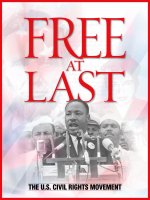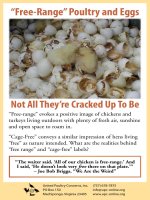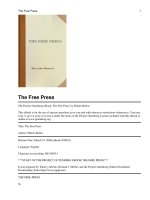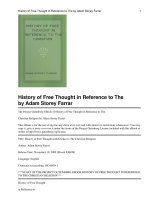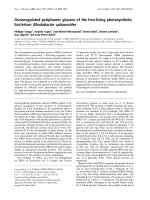The free range
Bạn đang xem bản rút gọn của tài liệu. Xem và tải ngay bản đầy đủ của tài liệu tại đây (759.64 KB, 202 trang )
TheProjectGutenbergeBook,TheFreeRange,byFrancisWilliamSullivan,
IllustratedbyDouglasDuer
ThiseBookisfortheuseofanyoneanywhereatnocostandwith
almostnorestrictionswhatsoever.Youmaycopyit,giveitawayor
re-useitunderthetermsoftheProjectGutenbergLicenseincluded
withthiseBookoronlineatwww.gutenberg.org
Title:TheFreeRange
Author:FrancisWilliamSullivan
ReleaseDate:December12,2008[eBook#27511]
Language:English
Charactersetencoding:ISO-8859-1
***START OF THE PROJECT GUTENBERG EBOOK THE FREE
RANGE***
E-textpreparedbyRogerFrank
andtheProjectGutenbergOnlineDistributedProofreadingTeam
()
Transcriber’snote:
ThetitlesgivenintheTableofContentsforChaptersVIIandVIIIdifferfromthechaptertitlesusedinthe
text.
Theyrodeneedlesslyclosetogetherandswungtheirclaspedhandslikehappychildren.
THEFREERANGE
BY
ELWELLLAWRENCE
ILLUSTRATIONSBY
DOUGLASDUER
GROSSET&DUNLAP
PUBLISHERS::NEWYORK
COPYRIGHT1913BY
W.J.WATT&COMPANY
PublishedJune
ToMATHEWWHITEJr.,
Editor,author,critic,friend.
CONTENTS
CHAPTER
I
II
III
IV
V
VI
VII
VIII
IX
X
XI
XII
XIII
XIV
XV
XVI
XVII
XVIII
XIX
XX
XXI
XXII
XXIII
XXIV
XXV
PAGE
FLINGINGTHEGAUNTLET
ALATEARRIVAL
ANUNSETTLEDSCORE
THESIXPISTOLSHOTS
STRATEGYANDASURPRISE
UGLYCOMPANY
YOUHAVEFORGOTTENTHEMASK
FIENDISHREVENGE
THEMANINTHEMASK
WARWITHOUTQUARTER
MADEPRISONER
JULIETASSERTSHERSELF
THEHEATHENCHINEE
SENTENCED
COWLANDTOPSY-TURVY
AMESSAGEBYASTRANGEHAND
ABATTLEINTHEDARK
THEIMMORTALTEN
ANINDIANCOULEE
SOMEBODYNEWTURNSUP
JULIEINVESTIGATES
THEUSEOFPHOTOGRAPHY
THECROSSING
THESTORYOFLESTER
THETHREADSMEET
9
18
31
39
50
64
74
85
98
114
124
136
149
161
176
190
203
217
235
245
253
265
279
289
301
THEFREERANGE
9
CHAPTERI
FLINGINGTHEGAUNTLET
“Thenyouinsistonruiningme,Mr.Bissell?”
BudLarkin,hishatpushedbackonhishead,lookedunabashedatthescowling
heavyfeaturesofthemanoppositeinthelong,lowroom,andawaitedareply.
“Idon’twanttoruinanybody,”puffedold“Beef”Bissell,whosecattleoverran
mostoftherangebetweentheGrayBullandtheBigHorn.“ButIallowashow
them sheep of yours had better stay down Nebrasky way where they come
from.”
“Inotherwords,”snappedLarkin,“Ihadbettergiveuptheideaofbringingthem
northaltogether.Isthatit?”
“Justabout.”
“Well,now,seehere,Mr.Bissell,youforgetoneortwothings.Thefirstis,that
my sheep ranch is in Montana and not Wyoming, and that I want to run10my
southern herds onto the northern range before fall sets in. The second is, that,
whileyourhomesteadmaybethreehundredandtwentyacres,therangethathas
madeyourichisfree.Mysheephaveasmuchrightthereasyourcattle.Itisall
governmentlandandopentoeverybody.”
“Possessioniselevenpointsoutherewherethereisn’tanylaw,”repliedBissell
imperturbably.“It’sacaseofyoursheepagainstmycattle,and,yousee,Istand
upreg’larformycows.”
Budrolledacigaretteandpondered.
Hewasintheratherbareandunornamentalliving-roomoftheBarTranch.In
the center was a rough-hewn table supporting an oil-lamp and an Omaha
newspaperfullysixmonthsold.Thechairs,exceptone,wereroughandheavy
and without rockers. This one was a gorgeous plush patent-rocker so valued a
generationago,andevidentlyimportedatgreatexpense.
11
Asquareofcarpetthathadlostallclaimstopatternhadbecomeasoftblur,the
resultofageandalkali.However,itwasoneoftheproudestpossessionsofthe
BarToutfitandshowedthatoldBeefBissellknewwhattherightthingwas.A
calico shroud hid a large, erect object against the wall farthest away from the
windows; an object that was the last word in luxury and reckless expense—a
piano. The walls were of boards whitewashed, and the ceiling was just plain
boards.
IthadnottakenBudLarkinlongtodiscernthattherewasafemininecausefor
thesenumerousunusualeffects;buthedidnotforaminutesupposeittobethe
thin,sharp-tonguedwomanwhohadbeenwashingbehindthecook-houseashe
rodeuptothecorral.Now,ashepondered,hethoughtagainaboutit.Butonly
foraminute;otherthingsofvasterimportanceheldhim.
Although but two men had spoken during the conversation, three were in the
room.Thethirdwasamanofmediumheight,loweringlooks,andslowtongue.
His hair was black, and he had the appearance of always needing a shave. He
wastraineddowntoperfectconditionbyhisyearsontheplains,andwasaswiry
andtoughasthecowponyherode.HewasBlackMikeStelton,foremanofthe
BarT.
“What do you think, Mike?” asked Bissell, when Larkin made no attempt to
continuetheargument.
“Same’syou,boss,”wasthereplyinaheavyvoice.“Iwouldn’tletthemsheep
ontherange,notnoways.Sheepistheruinationofanygrasscountry.”
“Thereyousee,Mr.Larkin,”saidBissellwithanexpressivemotionofhishand.
“Stelton’sbeenouthereinthebusinessfifteenyearsandsaysthesameasIdo.
HowlongdidyousayyouhadbeenintheWest?”
“One year,”repliedLarkin, flushingtothe rootsofhishairbeneathhis tanned
butnotweather-beatenskin.“CamefromChicago.”
“From down East, eh? Well, my woman was to St. Paul once, and she’s never
gotoverit;butitdon’tseemtohavespoiledyounone.”
Larkingrinnedandrepliedinkind,butallthetimehewastryingtodetermine
whatstandtotake.Hehadexpectedtomeetoppositionto“walking”hissheep
north—infact,hadmetitsteadily—butuptothispointhadmanagedtogethis
animalsthrough.Nowhewasfiftymilesaheadofthefirstflockandhadreached
theBarTranchanhourbeforedinner.
Hadhebeenasuspectedhorse-thief,theunwrittensocialetiquetteoftheplains
would have provided him with food and lodging as long as he cared to stay.
Consequently when he had caught the reflection of the setting sun against the
wallsoftheranchhouse,hehadturnedPinte’sheadinthedirectionofthecorral.
Then, in the living-room, though no questions had been asked, Larkin had
brought up the much-dreaded subject himself, as his visit was partly for that
purpose.
He had much to contend with. In the first place, being a sheepman, he was
absolutely without caste in the cattle country, where men who went in for the
“woollyidiots,”assomeonehasaptlycalledthem,wasconsideredforthemost
part as a degenerate, and only fit for target practice. This side of the matter
troubledhimnotatall,however.
Whatdidworryhimwastheelementofrightinthecattlemen’sattitude!aright
thatwasstillawrong.Forhehadtoacknowledgethatwhensheephadoncefed
acrossarange,thatrangewasruinedforcattlefortheperiodofatleastayear.
Thiswasduetothefactthatthesheep,croppingintotheveryrootsofthegray
grassitself,destroyedit.Moreover,theanimalsontheirslowmarches,herdedso
closetogetherthattheyleftanoffensivetrailratherthanfollowwhichthecattle
wouldstandandstarve.
Ontheotherhand,therangewasfreeandthesheephadasmuchrighttograze
thereasthecattle,afactthatthecattlemen,withalltheirstrictcodeofjustice,
refusedtorecognize.
LarkinknewthathehadcometothepartingofthewaysattheBarTranch.
OldBeefBissellwaswhatwasknownatthattimeasacattleking.Histhousands
ofsteers,wealthonthehoof,grazedfarandwideoverthefencelessprairies.His
rangeridersrarelysawtheranchhouseforamonthatatime,sogreatwashis
assumed territory; his cowboys outnumbered those of any owner within three
hundredmiles.Asidefromthis,hewastheheadofacattlemen’sassociationthat
hadbandedtogetheragainstrustlersandotherinvadersoftherange.
Larkinreturnedtotheconversation.
“Try to see it from my standpoint,” he said to Bissell. “If you had gone in for
sheepasIhave—”
“I wouldn’t go in for ’em,” interrupted the other contemptuously, and Stelton
grunted.
“Asyoulikeaboutthat.Everygophertohisownhole,”remarkedBud.“Butif
youhad,andIguessyouwouldifyouthoughttherewasmoremoneyinit,you
wouldcertainlyinsistonyourrightsontherange,wouldn’tyou?”
“Imighttry.”
“Andifyoutriedyou’dbeprettysuretosucceed,Iimagine.”
“It’slikely;IallowashowI’maprettygoodhandatsucceedin’.”
“Well,soamI.Ihaven’tgotveryfaryet,butIamonmyway.Ididn’tcomeout
heretomakeafailureofthings,andIdon’tintendto.Now,allIwantistorun
mysheepnorthontotheMontanarangewheremyranchis.”
“Howmanyarethere?”ThisfromStelton.
“Fiveflocksofabouttwothousandeach.”
Bissellsnortedandturnedinhischair.
“I won’t allow it, young man, an’ that’s all I’ve got to say. D’ye think I’m a
fool?”
“No,butneitheramI.AndImightaswelltellyoufirstandlastthatthosesheep
arecomingnorth.Now,ifyoudothefairthingyouwilltellyourcowboysthe
fact so they won’t make any mistakes. I have given you fair warning, and if
anythinghappenstothosesheepyouwillbeheldresponsible.”
“Isthatallyougottosay?”askedBissell,sarcastically.
“Yes.”
“Well,then,I’lldothetalkin’.I’dasleaveseeIndiansstampedin’mycowsinto
theriverashaveyoursheepcomeovertherange.Sinceyou’vegivenmewhat
youcallafairwarning,I’llgiveyouone.Leaveyourcritterswheretheyare.If
youdon’tdoityou’llbeasightwiserandalsoamightysightpoorerbeforeIget
throughwith’em.”
“Justwhatdoyoumeanbythat?”askedLarkin.
“I ain’t sayin’ nothin’ more than that now, because I’m a slow hand at makin’
ornerypromises,seein’Ialwayskeep’em.ButI’mjusttellin’you,that’sall.”
“Isthatyourlastwordonthesubject?”askedLarkin.
“Itis,an’IwantSteltonheretorememberIsaidit.”
“Thenwewon’tsayanythingmoreaboutthematter,”repliedBudcalmly,ashe
rose.“I’llgooutsideandlooktomyhorse.”
“You’llstaythenightwithus,won’tyou?”askedBissellanxiously.
“Yes, thanks. I’ve heard so much about the Bar T I should like to see a little
moreofit.”
When Larkin had left the room, Bissell, with a frown on his face, turned to
Stelton.
“Tell all the boys what’s happened to-day,” he said, “and tell ’em to be on the
watch for this young feller’s first herd. He’ll plenty soon find out he can’t run
riotonmyrange.”
CHAPTERII
ALATEARRIVAL
After visiting the corral, Larkin paid his respects to the pump and refreshed
himself for supper. Then he strolled around the long, rambling ranch house.
Across the front, which faced southwest, had been built a low apology for a
veranda on which a couple of uninviting chairs stood. He appropriated one of
theseandsettledbacktothink.
The late sun, a red-bronze color, hung just above the horizon and softened the
unlovelystretchesofprairieintosomethingbroodingandbeautiful.Thirtymiles
away the Rockies had become a mass of gray-blue fleeced across the top with
linesoflatesnow—foritwasearlyJune.
The Bar T ranch house itself stood on a rise of ground back from a cold,
greenish-blueriverthatmadeabendatthispoint,andthatroseandhaditsbeing
inthemeltingwhitenessofthosedistantpeaks.Betweenthewillowsoftheriver
bottoms,Larkincouldseetheredreflectionofthesunonthewater,andcould
follow the stream’s course across the prairie by the snake-like procession19of
cottonwoodsthatlineditsbanks.
Ontheplainsthemselvestherewasstillafadinghueofgreen.Thebuffalograss
had already begun to wither under the increasing heat, and in a month would
have become the same gray, cured fodder that supported millions of buffalo
centuriesbeforeasteerwasontherange.
For Bud Larkin, only a year in the West, this evening scene had not lost its
charm. He loved this hour when the men washed up at the pump. There were
enticingsoundsfromthecookhouseandenticingodorsintheair.Sometimesit
seemedasthoughitalmostmadeupforaday’sfailureanddiscouragement.
His quick eye suddenly noted a dark speck moving rapidly across the prairie
toward theranchhouse. Itseemedtoskimthegroundandinfiveminutes had
developedintoacowponyanditsrider.Aquarterofanhourlaterandthepony
proved himself of “calico” variety, while the rider developed into a girl who
20
bestrodehermountasthoughshewereapartoftheanimalitself.
The front rim of her broad felt hat was fastened upward with a thong and
exposed her face.Budwatched her idlyuntil she dasheduptothefrontofthe
house,fetchedherhorsebackonitshauncheswithajerkonthecruelSpanish
bridle,andleapedtothegroundbeforehehadfairlylostheadway.Thenwitha
slapontherumpshesenthimtrottingtoStelton,whohadappearedaroundthe
endoftheverandaasthoughexpectingher.
Occupiedwithpullingoffhersoftwhitebuckskingauntlets,shedidnotnotice
theyoungmanonthelowporchuntil,withanexclamation,hehadsprungtohis
feetandhurriedtowardher.
“JulietBissell!”gaspedLarkin,holdingoutahandtoher.“Whatareyoudoing
here?”
“Ofallpeople,BudLarkin!”criedthegirl,flushingwithpleasure.“Why,Ican’t
believeit!Didyoudropoutoftheskysomewhere?”
“Iftheskyisheaven,I’vejustdroppedintoit,”hereturned,tryingtoconfinehis
joytointelligiblespeech,andbarelysucceeding.
“ThatsoundslikethesameoldBud,”shelaughed,“andit’sapleasuretohearit.
Forifthereisonethingacowboycan’tdo,andit’stheonlyone,itistopaya
womanacompliment.Thatspeechbrandsyouatenderfoot.”
“Never!I’vebeenoutayearandcannearlyrideacowpony,providingitislame
andblind.”
So,banteringeachotherunmercifully,theyreachedthefrontdoor.
“Waitafewminutes,Bud,andIwillbeoutagain.Imustdressfordinner.”
When she had gone Larkin understood at once the presence of the carpet, the
patentrocker,andthepiano.
“Whatadouble-barreledidiotIam,”heswore,“totalkturkeytooldBisselland
neverconnecthimwithJuliet.Allthesheepintheworldcouldn’tgetmeaway
fromhereto-night.”Andheejaculatedthetime-wornbuttrueoldphrasethatthe
worldisamightysmallplace.
JulietBissellhadbeenaverydefinitepersonageinBudLarkin’sotherlife—the
life that he tried to forget. The eldest son of a rich Chicago banker, his first
twenty-fiveyearshadbeensuchyearsasamanalwayslooksbackuponwitha
vastregret.
FromthemansiononSheridanDrivehehadvariedhistimeamonghisclubs,his
sports, and his social duties, and generally made himself one of many in this
world that humanity can do without. In other words, he added nothing to
himself,others,orlifeingeneral,andwas,therefore,withoutarealexcusefor
existing.
Ofonethinghewaseverzealous,nowthathehadleftitbehind,andthiswas
thathispastshouldnotpursuehimintothenewlifehehadchosen.Hewishedto
starthiscareerwithoutstigma,andenditwithoutblame.
Strangely enough, the person who had implanted this ambition and
determinationinhimwasJulietBissell.Threewintersbefore,hehadmetherat
thecharityball,andatthetimeshewassomethingofasocialsensation,being
described as “that cowgirl from Wyoming.” However, that “cowgirl” left her
markonmanyagildedyouth,andBudLarkinwasone.
He had fallen in love with her, as much as one in his position is capable of
falling in love, had proposed to her, and been rejected with a grace and
gentleness that had robbed the blow of all hurt—with one exception. Bud’s
pride, since his wealth and position had meant nothing in the girl’s eyes, had
been sorely wounded, and it had taken six months of the vast mystery of the
plainstoreducethispettinesstothestatusofasecretshame.
When Juliet refused him she had told him with infinite tact that her husband
wouldbeamanmoreafterthepatternofherfather,whomsheadored,andwho,
inturn,worshipedtheveryairthatsurroundedher;anditwasthisfactthathad
turnedBud’sattentiontotheWestanditsopportunities.
When she returned to the porch Juliet had on a plain white dress with pink
ribbons at elbows, neck, and waist. Larkin, who had always thrilled at her
splendid physical vigor, found himself more than ever under the spell of her
luxuriantvitality.
Her great dark eyes were remarkably lustrous and expressive, her black hair
wavedbackfromherbrownfaceintoagreatbraidedcoil,herfeatureswerenot
pretty so much as noble. Her figure, with its limber curves, was pliant and
gracefulinanypositionoremergency—theresultofyearsinthesaddle.Herfeet
andhandsweresmall,thelatterbeingfirmbutinfinitelygentleintheirtouch.
“Well,haveyouforgottenallyourEasterneducation?”Larkinasked,smiling,as
shesatdown.“Haveyourevertedtoyouroriginaluntamedcondition?”
“No,indeed,Bud.Ihaveareputationtokeepupinthatrespect.ThefactthatI
havehadanEasterneducationhasmadeourpuncherssoproudthattheycan’tbe
livedwithwhentheygototown,andlorditovereverybody.”
“Isupposetheyallwanttomarryyou?”
“Yes,singlyorinlots,andsometimesI’msorryitcan’tbedone,Ilovethemall
so much. But tell me, Bud, what brings you out West in general and here in
particular?”
“Probably you don’t know that a year and a half ago my father died,” and
Larkin’sfaceshadowedforamomentwithretrospection.“Well,hedid,andleft
memostofhisestate.Iwassickofitthere,andIvowedIwouldpullupstakes
andstartsomewherebymyself.SoIwentuptoMontanainthevicinityofthe
MusselshellForksandboughtaranchandsomestock.”
“Cattle?”
“No,sheep.ThebestmerinoIeversaw—”
“BudLarkin!You’renotasheepman?”
“Yes, ma’am, and a menace to a large number of cowmen, your father among
them.”
Thegirlsankbackandallowedhimtorelatethestoryofhisadventuresuptothe
present time, including the interview with Beef. At the description of that she
smiledgrimly;andhe,notingthefact,toldhimselfthatitwouldtakeamasterly
charactertosubduethatfree,wildpride.
“Now, Julie,” he concluded, “do me the favor of instilling reason into your
father.I’vedonemybestandwehavepartedwithoutmurder,butthat’sall.I’ve
gottohaveafriendatcourtorIwillberuinedbeforeIcommence.”
Thegirlwassilentforafewminutesandsatlookingdownatherslipperedfeet.
“Bud,”shesaidatlast,“you’veneverknownmetotellanythingbutthetruth,
and I’m going to tell it to you now. I will be your friend in everything except
whereyouaskmetoyieldmyloyaltytomyfatherandhisinterests.Heisthe
mostwonderfulfatheragirleverhad,andifheweretosaythatblackwaswhite,
Ishouldprobablysweartoitifheaskedmeto.”
“I admire you for that,” said Bud genuinely, although all his hopes in this
powerful ally went glimmering. “Let’s not talk shop any longer. It’s too good
justtoseeyoutothinkaboutanythingbutthat.”
So,forawhile,theyreminiscedofthedaysoftheirformerfriendship,bytacit
agreementavoidinganyreferencetointimatethings.AndLarkinfeltspringup
inhimtheoldlovethathehadconvincedhimselfwasdead;sothatheaddedto
hisfirstresolutiontosucceedontherange,asecond,thathewould,intheend,
conquerJulietBissell.
The thought was pleasing, for it meant another struggle, another outlet for the
energies and activities that had so long lain dormant in him. And with the
undauntedcourageofyouthhelookedeagerlytowardthebattlethatshouldwin
thisradiantgirl.
Butforthepresentheknewhemustnotbetrayhimselfbyword,lookoraction;
otherthingsofgreatermomentmustbesettled.
Atlast,astheytalked,thecook,along-sufferingChinaman,seizedahugebrass
bellandrangitwithallhismight,standinginthedoorofthecookhouse.
Therewasaninstantresponseinthewildwhoopofthecowboyswhohadbeen
sufferingthepangsofstarvationforthepasthalf-hour.
“Ofcourseyoumustcometoourprivatetable,Bud,”saidJuliet.“Iwantyouto
seefather’sotherside.”Sotheyroseandwentinthefrontway.
The ranch house had been planned so that to the right of the entrance was the
living-room, and back of that the dining-room. To the left three smaller rooms
had been made into sleeping apartments. At the back of the structure and
extendingacrossthewidthofitwasalargeroomthat,intheearlydaysofthe
BarT,hadservedasthebunk-houseforthecowpunchers.
Thishadnowbeenchangedtothemess-roomforthem,whilethefamily,with
theadditionofStelton,theforeman,usedthesmallerprivateroom.Owingtothe
largeincreaseinthenumberofBarTpunchersaspecialbunk-househadbeen
builtintherearofthemainstructure.
At table Larkin for the first time met Mrs. Bissell, who proved to be a typical
early cowman’s wife, thin, overworked, and slightly vinegary of disposition,
despitethefactthatshehadatonetimeinherlifebeenthebelleofacowtown,
andhadbeenwonfrombeneaththeready.45’sofanumberofrivals.
At Bud’s entrance Stelton grunted and scowled, and generally showed himself
ill-pleased that Juliet should have known the visitor. On the other hand, as the
girlhadpromised,BeefBissell,foryearstheterroroftherange,displayedaside
that the sheepman would never have suspected. His voice became gentle, his
laughsoftened,hislanguagepurified,andheshowed,bymanylittleattentions,
theunconsciouschivalrythatworshipofagoodwomanbringstothesurface.
Forherpart,thegirlappraisedthisdevotionatitstruevalueandneverfailedin
thelittlefemininethoughtfulnessesthatappealsostronglytoaworriedandbusy
man.
ThatSteltonshouldbeatthetableatallsurprisedBud,foritwasnotthehabitof
foremen to eat away from the punchers. But here the fact was the result of a
former necessity when Bissell, hard-pressed, had called his foreman into
consultationatmealtimes.
OldBissellprovedhimselfamoregenialhostthanbusinessrival,andwhenhe
hadlearnedofLarkinandhisdaughter’sformerfriendship,heforgotsheepfor
the moment and took an interest in the man. Mrs. Bissell sat open-mouthed
while Bud told of the glories of Chicago in the early eighties, and never once
mentionedherfamousvisittoSt.Paul,soovercomewasshewiththetalesthis
youngmanrelated.
Everyonewasathisorhereasewhentherapidtattooofhoofswasheard,anda
horseandriderdrewupabruptlyatthecorral.Oneofthepunchersfromtherear
dining-room went out to meet him and presently appeared sheepishly in the
doorwaywhereBissellcouldseehim.
“IsthereaMr.Larkinhere?”askedthepuncher.
“Yes,”saidBud,pushingbackhischair.
“There’sastrangeroutherethat’lowshewantstoseeyou.”
“Sendhiminhereandgivehimsomethingtoeat,Shorty,”sangoutBissell.“If
he’safriendofLarkin’s,he’dbetterhavedinnerwithhim.And,Shorty,tellthat
Chinamantorustleanotherplaceherepronto!”
AsforBudLarkin,hewasatatotallosstoknowwhohisvisitormightbe.With
a sudden twinge of fear he thought that perhaps Hard-winter Sims, his chief
herder,hadpursuedhimwithdisastrousinformationfromtheflocks.Wondering,
heawaitedthevisitor’sappearance.
Thestrangerpresentlymadeaboldandnoisyentrance,and,whenhisfacecame
intoview,Budsankbackinhischairweakly,hisownpalingatriflebeneaththe
tan.ForthemanwasSmithyCaldwell,ashifty-eyedcrook fromChicago,one
whohaddoggedhimbefore,andwhomhehadneverexpectedtoseeagain.How
thevillainhadtrackedhimtotheBarToutfitBudcouldnotimagine.
Seeingtheeyesoftheothersuponhim,Larkinrecoveredhimselfwithaneffort
and introduced Caldwell; but to the eyes of even the most unobservant it was
plain that a foreign element of disturbing nature had suddenly been projected
intothegenialatmosphere.Themanwascoarseinmannerandspeechandoften
addressedleeringremarkstoJuliet,whodisregardedthemutterlyandconfined
herattentiontoBud.
“Whoisthiscreature?”sheaskedsottovoce.“Whatdoeshewantwithyou?”
Budhesitated,madetwoorthreefalsestarts,andfinallysaid:
“Iamsurehisbusinesswithmewouldnotinterestyou.”
“Ibegyourpardon,”saidthegirl,rebuffed.“Iseemtohaveforgottenmyself.”
“IwishIcould,”ejaculatedBudbitterly,andrefusedtoexplainfurther.
CHAPTERIII
ANUNSETTLEDSCORE
AssoonafterdinneraspossibleLarkindisengagedhimselffromtherestofthe
party and motioned Caldwell to follow him. He led the way around the house
andbacktowardthefenceofthecorral.Itwasalreadydark,andtheonlysounds
werethoseofthehorsesstirringrestlessly,orthelowbellowofoneoftheranch
milchcows.
“Whatareyoudoingouthere?”demandedBud.
“Icametoseeyou.”Theotheremittedanexasperatingchuckleathisowncheap
wit.
“Whatdoyouwant?”
“You know what I want.” This time there was no chuckle, and Bud could
imagine the close-set, greedy eyes of the other, one of them slightly crossed,
boringintohiminthedark.
“Money,Isuppose,youwhiningblood-sucker,”suggestedBud,hisvoicequiet,
32
butholdingacold,unpleasantsortofringthatwasnewtoCaldwell.
“‘Theboyguessedrighttheveryfirsttime,’”quotedSmithy,unabashed.
“WhatbecameofthattwothousandIgaveyoubeforeIleftChicago?”
“Igotlittleenoughofthat,”criedCaldwell.“Youknowhowmanypeoplethere
weretobehushedup.”
“Many!” snappedLarkin.“Youcan’tcomeanyofthatonme.Therewere just
three;yourself,yourwife,andthatred-headedfellow,—Iforgethisname.”
“Well,mywifedoesn’tlivewithmeanymore,”whinedSmithy,“butshemakes
mesupportherjustthesame,andthreatenstosquealonyouifIdon’tproduce
regularly;sheknowswherethemoneycomesfrom.”
SuddenlyLarkinsteppedclosetotheotherandthrustsomethinglongandhard
againsthisribs.
“I’mgoingtodoforyounow,Smithy,”hesaidinacold,evenvoice.Caldwell
didnotevenmovefromhisposition.
“If you do,” was his reply, “the woman will give the whole thing to the
newspapers.Theyhavesmelledaratsolongtheywouldpaywellforatip.She
hasallthedocuments.Soifyouwanttoswingandruineverybodyconcerned,
justpullthattrigger.”
“I knew you were lying.” Bud stepped back and thrust his revolver into the
holster.“Youarestilllivingwithyourwife,forshewouldn’thavethedocuments
ifyouweren’t.Amanrarelylieswhenheiswithintwosecondsofdeath.You
areuptoyouroldtricks,Smithy,andtheyhaveneverfooledmeyet.Now,let’s
getdowntobusiness.Howmuchdoyouwant?”
“Twothousanddollars.”
“Ihaven’tgotit.Youdon’tknowit,perhaps,butmymoneyisonthehoofoutin
thiscountry,andcashisverylittleused.Lookhere.Youbringyourwifeandthat
red-headedchapouttoArizonaorCaliforniaandIwillsetyouupinthesheep
business.I’vegotherdscomingnorthnow,butI’llturnathousandbackinyour
name,and bythe timeyouarrivetheywillbeonthesouthernrange. Whatdo
yousay?”
“Isayno,”repliedtheotherinanuglyvoice.“Iwantmoney,andI’mgoingto
haveit.GoodoldChiisrangeenoughforme.”
“Well,Ican’tgiveyoutwothousandbecauseIhaven’tgotit.”
“Whathaveyougot?”
“Fivehundreddollars,thepayofmyherders.”
“I’lltakethatonaccount,then,”saidCaldwellinsolently.“Whenwillyouhave
somemore?”
“NotuntiltheendofJuly,whenthewoolhasbeenshippedEast.”
“Allright.I’llwaittillthen.Comeon,handoverthefivehundred.”
Larkin reachedinside hisheavy woolenshirt,openeda chamoisbagthat hung
byastringaroundhisneck,andemptieditofbills.ThesehepassedtoCaldwell
withoutaword.
“Ifyouarewise,Smithy,”hesaidinanevenvoice,“youwon’taskmeforany
more.I’veaboutreachedtheendofmyropeinthisbusiness.Andletmetellyou
thatthisaccountbetweenyouandmeisgoingtobesettledinfulltomycredit
beforeverylong.”
“Maybeandmaybenot,”saidtheotherinsolently,andwalkedoff.
Five minutes later Bud Larkin, sick at heart that this skeleton of the past had
risenuptoconfronthiminhisnewlife,madehiswayaroundtheranchhouseto
thefrontentrance.Justashewasgoinginatthedooramanappearedfromthe
oppositesidesothatthetwomet.Theotherskulkedbackanddisappeared,butin
that moment Bud recognized the figure of Stelton, and a sudden chill clutched
hisheart.
HadtheforemanoftheBarTbeenlisteningandheardall?
Entering the living-room, where the Bissells were already gathered, Larkin
expectedtofindCaldwell,butinquiryelicitedthefactthathehadnotbeenseen.
Fiveminuteslaterthedrummingofapony’sfeetonthehardgroundsuppliedthe
solutionofhisnon-appearance.HavingsatisfactorilyinterviewedLarkin,hehad
mountedhishorse,whichallthistimehadbeentetheredtothecorral,andridden
away.
Half an hour later Stelton came in, his brow dark, and seated himself in a far
corneroftheroom.Fromhismanneritwasevidentthathehadsomethingtosay,
andBisselldrewhimout.
“RedcameinfromoverbySiouxCreekto-night,”admittedtheforeman,“and
hesaysashowtherustlershavebeenbusythat-a-wayag’in.Firstthinghesaw
wasthetracksoftheirhosses,andthen,whenhecountedtheherd,founditwas
twentyheadshort.I’mshoreputoutaboutthemrustlers,chief,andifsomething
ain’t done about it pretty soon you won’t have enough prime beef to make a
decentdrive.”
Instantly the face of Bissell lost all its kindliness and grew as dark and
forbidding as Stelton’s. Springing out of his chair, he paced up and down the
room.
“That has got to stop!” he said determinedly. Then, in answer to a question of
Larkin’s: “Yes, rustlers were never so bad as they are now. It’s got so in this
Statethatthethieveshavegotmorecowsamong’emthantheregularcowmen.
An’thatain’tall.They’vegotanorganizationthatwecan’ttouch.We’replumb
locoedwiththeirdevilment.That’sthesecondbunchcutoutofthatherd,ain’tit,
Mike?”
“Yes.”
Beef Bissell, his eyes flashing the fire that had made him feared in the earlier,
rougherdaysoftherange,finallystoppedatthedoor.
“ComeonoutwithmeandtalktoRed,”heorderedhisforeman,andthelatter,
whoseeyeshadneverleftJulietsinceheenteredtheroom,reluctantlyobeyed.
PresentlyMrs.Bisselltookherselfoff,andBudandthegirlwereleftalone.
“Isupposeyou’llmarrysometime,”saidLarkin,afteralongpause.
“Isincerelyhopeso,”washerlaughingrejoinder.
“Anycandidatesatpresent?”
“NotthatIknowof.”
“Well,Iknowofaveryactiveone—hejustlefttheroom.”
“Who,Mike?Bud,that’spreposterous!I’veknownhimeversinceIwasalittle
girl, and would no more think of marriage with him than of keeping pet
rattlesnakes.”
“Perhaps not, Julie, but Mike would. Will you take the word of an absolutely
disinterestedobserverthatthemanisalmostmadaboutyou,andwouldsellhis
soulforoneofyoursmiles?”
Thegirlwasevidentlyimpressedbytheseriousnessofhistone,forshepondered
aminuteinsilence.
“Perhapsyouareright,Bud,”shesaidatlast.“Ihadneverthoughtofitthatway.
Butyouneedn’tworry;Icantakecareofmyself.”
“I’msureofit,butthatdoesn’tmakehimanythelessdangerous.Keepyoureye
onhim,andifyoueverfindyourselfinaplacewhereyouneedsomebodybad
andquick,sendforme.Hehatesmealready,andIcan’tsayIlovehimanytoo
well;IhaveanideathatheandIwillcometocloserquartersthanwillbegood
forthehealthofoneofus.”
“Nonsense, Bud; your imagination seems rather lively to-night. Now, just
becauseIamcurious,willyoutellmewhyyouwentintothesheepbusiness?”
“Certainly. Because it is the future business of Wyoming and Montana. Sheep
canliveonlessandunderconditionsthatwouldkillcows.Moreover,theyarea
sourceofdoubleprofit,bothfortheirwoolandtheirmutton.Thefinalstruggle
oftherangewillbebetweensheepandcattleandirrigation,andirrigationwill
win.
“But the sheep will drive the cattle off the range, and, when they, in turn, are
driven off, will continue to thrive in the foothills and lower mountains, where
thereisnoirrigation.Iwentintothesheepbusinesstomakemoney,butIwon’t
seemuchofthatmoneyforseveralyears.WhenIamgettingrich,cowmenlike
yourfatherwillbefightingforthemaintenanceofafewlittleherdsthathavenot
beenpushedofftherangebythesheep.Cattleoffermoreimmediateprofit,but,
accordingtomyview,theyaredoomed.”
“Bud,that’sthebestdefenseofwool-growingIeverheard,”criedthegirl.“Up
tothisI’vehelditagainstyouthatyouwereasheepman—asillyprejudice,of
course, that I have grown up with—but now you can consider yourself free of
that.Ibelieveyouhavehitthenailonthehead.”
“Thanks,IbelieveIhave,”saidBuddryly,andalittlewhilelatertheyseparated
forthenight,butnotbeforehehadremarked:
“Ithinkitwouldbenefitallofusifyoudrilledsomeofthatcommon-senseinto
yourfather.”
39

